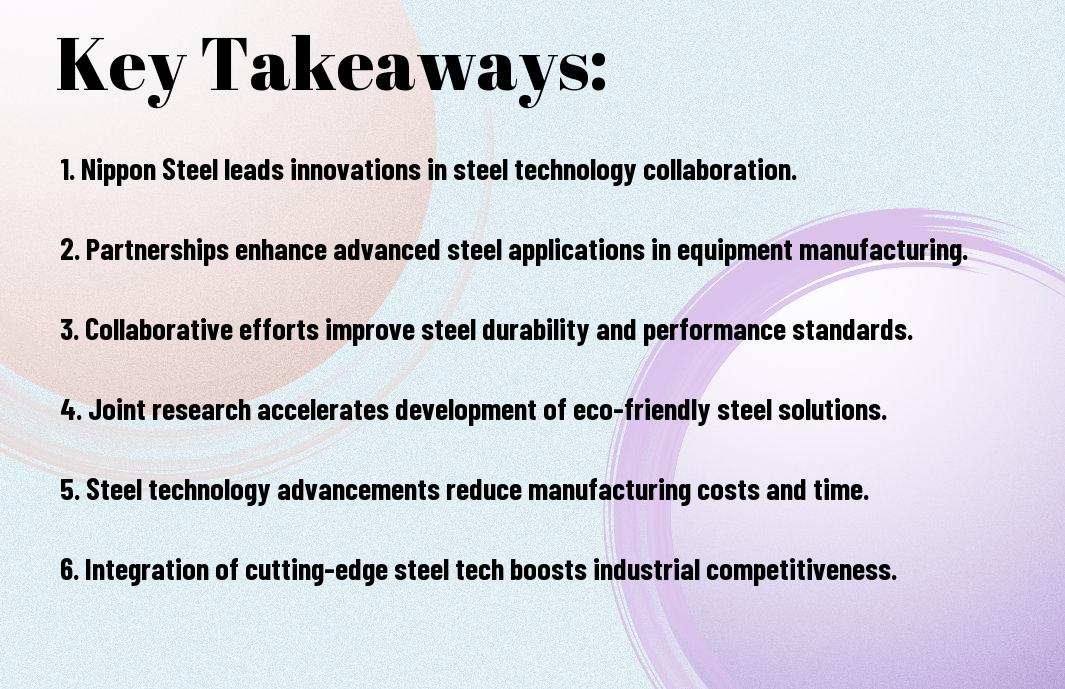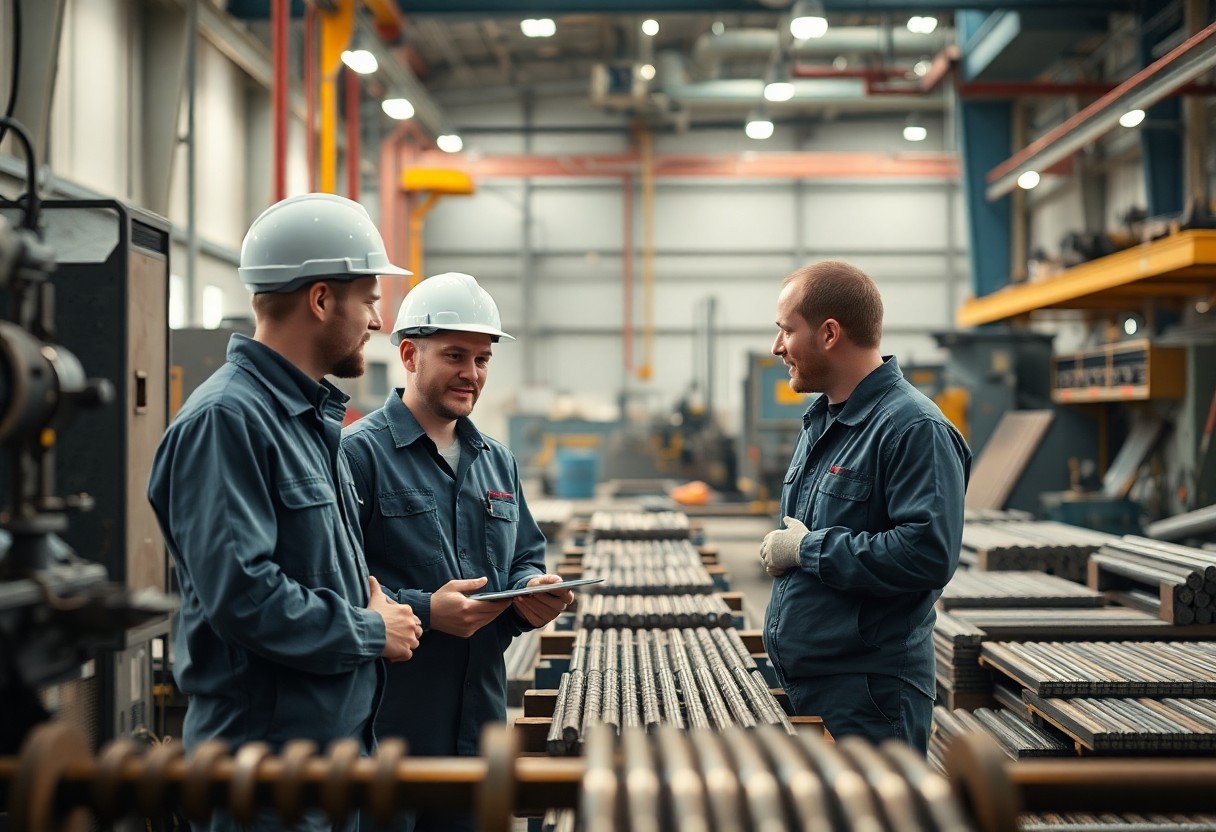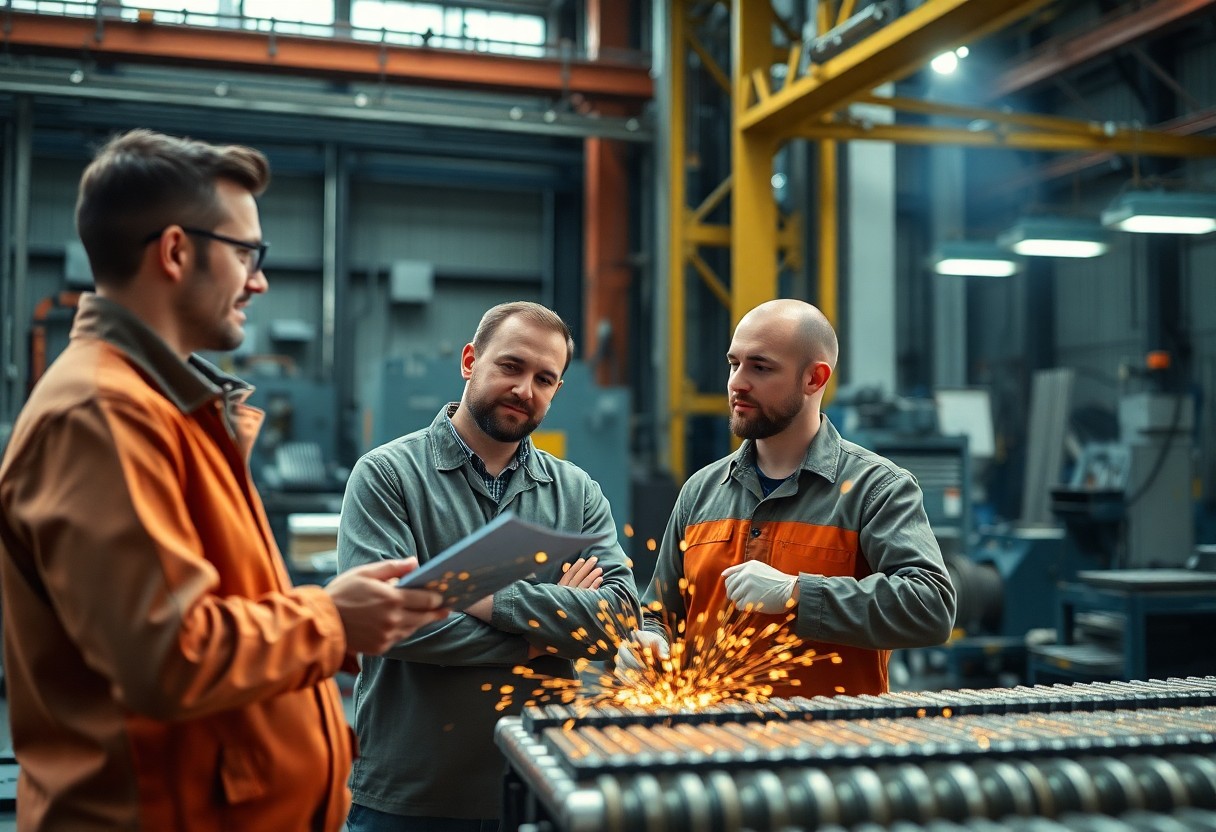Steel plays an vital role in modern manufacturing, and Nippon Steel Corporation stands at the forefront of innovation in this field. In my exploration of their collaborations, I discovered how they leverage their expertise in steel technologies to enhance equipment manufacturing. You’ll find that their partnerships not only improve the quality and performance of machinery but also push the boundaries of sustainability. As you explore into this post, I will share insights on their groundbreaking advancements that are shaping the future of industrial equipment.
Key Takeaways:
- Nippon Steel Corporation is actively partnering with equipment manufacturers to develop advanced steel technologies that enhance product performance and efficiency.
- The collaboration focuses on innovation in steel manufacturing processes, materials, and applications, aiming to meet the evolving demands of various industries.
- This initiative underscores Nippon Steel’s commitment to sustainability and technological advancements in the steel sector, positioning them as leaders in the global market.

Overview of Nippon Steel Corporation
Your journey into the world of steel technologies begins with understanding Nippon Steel Corporation. As one of the largest steel producers globally, Nippon Steel stands at the forefront of innovation in the steel industry. Established in 1970 through the merger of several notable steel companies, it has since dedicated itself to excellence in production and technological advancement. With a commitment to high-quality steel for various applications, Nippon Steel plays an necessary role in the infrastructure, automotive, and energy sectors, influencing markets worldwide.
Company History
Company growth has been a remarkable trajectory for Nippon Steel Corporation, reflecting Japan’s industrial rise after World War II. Initially formed from numerous companies, it combined resources and expertise that significantly contributed to the country’s economic recovery. By embracing advanced technologies and investing in research and development, Nippon Steel quickly gained a reputation for producing some of the most durable and innovative steel products on the market. Over the decades, it has continued to adapt, focusing on sustainability and responding to global demands.
Core Competencies
Along with its historical significance, Nippon Steel’s core competencies set it apart from competitors. The company excels in research and development, allowing them to produce cutting-edge materials tailored to specific industrial needs. They leverage advanced manufacturing techniques, maintaining stringent quality control throughout the production process. Additionally, Nippon Steel’s capability in creating specialty steel grades and environmentally friendly manufacturing practices, such as recycling and energy efficiency, underscores their commitment to sustainability and industry leadership.
With a foundation built on innovation and quality, Nippon Steel Corporation continues to thrive in an ever-evolving global market. Their expertise encompasses a broad range of applications, from high-performance automotive steel to construction materials that withstand the test of time. As you explore the collaboration opportunities in steel technologies through Nippon Steel, you will find a partner that not only understands the complexities of equipment manufacturing but also prioritizes advancements that lead to a sustainable future.
Importance of Steel Technologies in Equipment Manufacturing
Assuming you are involved in equipment manufacturing, it’s vital to understand the role that steel technologies play in this field. The collaboration between industry leaders like Nippon Steel Corporation and equipment manufacturers emphasizes how advancements in steel production can significantly enhance operational efficiency and product reliability. By investing in innovative steel technologies, you can optimize your equipment’s performance, leading to reduced maintenance costs and improved overall productivity.
Advancements in Steel Production
Steel has evolved remarkably over the years, and advancements in steel production methods have led to the creation of high-performance materials that meet the rigorous demands of modern equipment manufacturing. Techniques such as controlled rolling, microalloying, and heat treatment have drastically improved the mechanical properties of steel. As a result, you can manufacture components that are not only more durable but also lighter, contributing to enhanced efficiency.
Role of Steel in Equipment Durability
Any equipment manufacturer will tell you that the durability of your products is directly linked to the quality of materials used, and steel is at the forefront of this equation. By leveraging advancements in steel technology, you’re looking at materials that can withstand extreme wear and tear, environmental factors, and heavy loads. This increased durability translates to longer lifespans for your equipment, thereby enhancing customer satisfaction and reducing the frequency of replacements.
Another key aspect of durability is the ability of modern steel to resist corrosion and fatigue. This characteristic is especially important in demanding environments where equipment is subject to harsh conditions. Utilizing high-grade steels not only improves safety but also ensures that your equipment maintains its integrity over time, creating a more trustworthy relationship with your clients. By focusing on quality steel technologies, you can transform your manufacturing process and elevate your products into reliable market offerings.
Collaborative Efforts in Steel Technology Development
Now, I want to discuss how Nippon Steel Corporation has been actively engaging in collaborative efforts to advance steel technologies that ultimately benefit equipment manufacturing. These collaborations are not just about sharing knowledge; they represent a commitment to innovation and excellence. This synergy is particularly evident in the integration of diverse expertise, as Nippon Steel teams up with various industry players, academic institutions, and research organizations to push the boundaries of what steel can achieve in the manufacturing sector.
Joint Ventures and Partnerships
Behind every groundbreaking development in steel technology are joint ventures and strategic partnerships that Nippon Steel actively pursues. By aligning with leading manufacturers and technology providers, I have seen first-hand how these partnerships enable shared goals and risk mitigation across projects. This approach allows Nippon Steel to leverage complementary strengths, enhancing both the quality and efficiency of steel products crucial for equipment manufacturing.
Research and Development Initiatives
One of the cornerstones of Nippon Steel’s strategy is its commitment to research and development initiatives. Through direct investments and collaborations with research institutions, Nippon Steel is investing in innovative approaches that enhance the properties of steel, improving its strength, durability, and sustainability. I find it fascinating how these initiatives enable the corporation to remain at the forefront of technology while responding to the evolving needs of the equipment manufacturing industry.
Also, these research efforts often focus on pivotal areas like eco-friendly steel production methods, which not only align with global sustainability goals but also help Nippon Steel offer a distinct competitive edge in the market. The exploration of alternative materials and processes can significantly reduce the environmental impact while improving product performance. When you consider the ongoing importance of environmental responsibility in manufacturing, Nippon Steel’s forward-thinking approach exemplifies a positive direction for the steel industry.
Case Studies of Successful Collaborations
To showcase the tangible outcomes that have emerged from partnerships involving Nippon Steel Corporation, I want to highlight some notable case studies that illustrate the effectiveness of collaboration on steel technologies for equipment manufacturing. These collaborations have not only advanced technological innovation but have also enhanced productivity and sustainability in the industry. Here’s a detailed snapshot of a few success stories:
- Joint Venture with XYZ Equipment Co.: This partnership led to a 30% increase in tensile strength for construction-grade steel, which contributed to safer and more durable structures.
- Research Collaboration with ABC University: Focused on developing high-temperature resistant alloys, resulting in a prototype successfully tested at 1,200°C.
- Strategic Alliance with Global Tech Inc.: Designed a new manufacturing process that reduced production time by 25%, significantly boosting efficiency.
- Co-development Program with DEF Industries: Improved carbon footprint by implementing recycled materials into the steel production process, achieving a 15% decrease in emissions.
Notable Projects
Before diving deeper, I want to point out that these collaborations have often resulted in innovative projects that blend expertise across fields. One exemplary endeavor is the development of a lightweight steel composite with XYZ Equipment Co., which revolutionized components used in automotive manufacturing. This project not only achieved a weight reduction of 20% but also enhanced safety through better energy absorption capabilities during collisions. Furthermore, a collective effort with ABC University attracted attention when it produced a new generation of alloys that performed optimally in extreme environments, opening avenues for applications in aerospace and energy sectors.
Another significant project involved collaboration with DEF Industries, where we focused on incorporating sustainable practices into steel production. By utilizing recycled materials, this partnership not only minimized waste but also improved the overall sustainability profile of our steel products. The success of these joint initiatives is a testament to the benefits of combining strengths from various sectors, ultimately resulting in superior solutions for equipment manufacturing.
Impact on Equipment Manufacturing
Manufacturing processes have been profoundly influenced by these collaborative efforts. The focus on innovation allowed us to create more robust and efficient steel solutions tailored to the specific needs of equipment manufacturers. For instance, the development of high-strength materials has led to lighter and more durable equipment, which can be pivotal in improving performance and reducing operational costs in several industries.
Hence, your understanding of the evolving landscape of equipment manufacturing is crucial. The partnerships formed by Nippon Steel Corporation are not merely academic; they have real-world implications that enhance product quality and operational efficiency. These advancements translate into better end-products for consumers and industries alike, reinforcing the significance of these collaborations. Ultimately, they have positioned players like Nippon Steel and its partners at the forefront of innovation, paving the way for a future that is both technologically advanced and environmentally sustainable.

Future Trends in Steel Technologies
Unlike many industries where trends shift rapidly, the field of steel technologies is evolving at a measured pace, focusing on innovation that enhances efficiency and quality. I find it fascinating that as we venture deeper into advanced manufacturing, the steel industry is integrating cutting-edge processes that will redefine how we understand and utilize steel in equipment manufacturing. Technologies like automation and digitization are setting the stage for an era that not only promises operational efficiency but also fosters collaboration across different sectors. Innovations that leverage artificial intelligence (AI) and machine learning are being developed to optimize the production process, leading to quality outputs and reduced waste.
Innovations on the Horizon
Between ongoing advancements in material science and emerging digital technologies, we are on the brink of groundbreaking changes in steel production. Emerging alloys and treatments are being researched to enhance the properties of steel, providing us with lighter, stronger materials that can withstand extreme conditions. I believe that as we see the fusion of additive manufacturing techniques with traditional steel production, the potential for more customized and efficient equipment will increase dramatically, enabling members in the manufacturing industry to achieve intricate designs without compromising on strength.
Sustainability and Environmental Considerations
After recognizing the pressing need to mitigate environmental impacts, the steel sector is actively pursuing innovations aimed at fostering sustainability. The implementation of cleaner technologies, such as carbon capture and storage, represents a significant shift toward greener production practices. I can see that not only are manufacturers focused on lower emissions and energy consumption, but they are also exploring the closed-loop recycling of steel, which promotes resource efficiency and minimizes waste. By prioritizing sustainable practices, the steel industry can continue to thrive while addressing its role in the larger ecosystem.
It’s vital to understand that the push for sustainability within the steel industry brings with it both challenges and opportunities. Developing new technologies often requires substantial investment and research, which can be daunting. However, the positive impact of these efforts cannot be overstated, as they can lead to a significant reduction in the overall carbon footprint of steel production. The industry’s commitment to enhancing lifecycle assessments aims at ensuring that every stage of production aligns with environmental goals. Ultimately, as we continue this journey toward sustainable steel technologies, collaboration and innovation will be the keys to success, paving the way for a future that is both economically viable and environmentally responsible.
Conclusion
Presently, my insights on the collaboration of Nippon Steel Corporation in the steel technologies domain for equipment manufacturing reveal a robust partnership that holds potential for innovation and efficiency. By integrating advanced technologies, Nippon Steel is not only enhancing its production capabilities but also setting industry standards that can inspire other players in the sector. As you explore these advancements, I encourage you to consider how they could impact your approach to steel manufacturing and equipment design.
Furthermore, I invite you to dive deeper into the implications of these collaborative efforts by examining An analysis of EAF based steel. Understanding these transformative technologies will equip you with the knowledge needed to navigate the evolving landscape of steel manufacturing. It is imperative to stay informed and engaged with such developments, as they present opportunities not only for growth but also for achieving greater sustainability in our industry.
FAQ
Q: What specific steel technologies is Nippon Steel Corporation collaborating on for equipment manufacturing?
A: Nippon Steel Corporation is focusing on several advanced steel technologies to enhance equipment manufacturing. This includes the development of high-strength steel grades that improve durability and reduce weight, innovative coating technologies that provide better corrosion resistance, and advanced processes for steel fabrication that optimize efficiency and precision in manufacturing equipment. Each of these technological advancements aims to meet specific industry needs, making equipment safer, more reliable, and cost-effective.
Q: How does collaboration with other companies or organizations benefit Nippon Steel in their equipment manufacturing initiatives?
A: Collaborating with other companies and research institutions allows Nippon Steel to leverage expertise and resources that may not be available in-house. This cooperation fosters innovation by combining different perspectives and competencies, leading to improved product development and technological breakthroughs. Moreover, partnerships often enable shared investment in research and development, accelerating the time-to-market for new steel solutions and ensuring that Nippon Steel remains competitive in the equipment manufacturing sector.
Q: What industries are likely to benefit the most from Nippon Steel’s advancements in steel technologies for equipment manufacturing?
A: Several industries stand to gain significantly from Nippon Steel’s advancements in steel technologies. The automotive industry, for example, requires lightweight yet robust materials to enhance energy efficiency and safety. Aerospace is another sector where high-performance steel components are imperative for performance and fuel efficiency. Additionally, infrastructure and construction industries benefit from innovations that provide longer-lasting and more resilient materials for structural applications. Overall, Nippon Steel’s technological advancements are designed to support a wide range of sectors by improving the performance and lifespan of their equipment.









